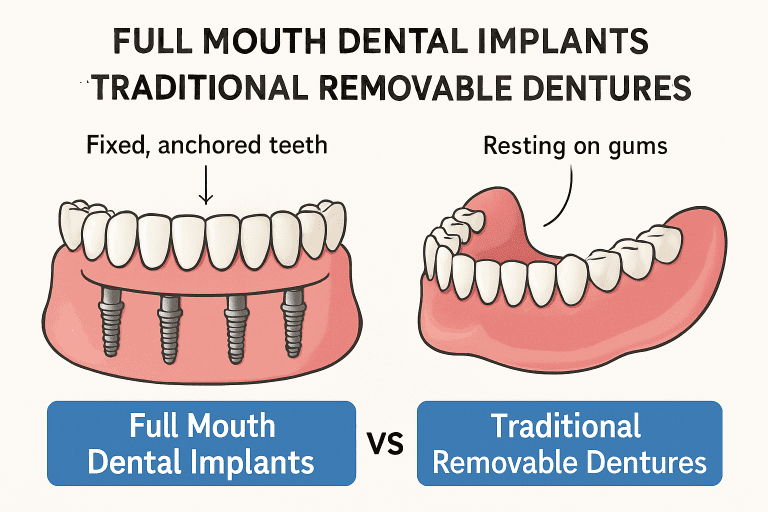Should You Consider Full Mouth Dental Implants?

Table of Contents
- What Are Full Mouth Dental Implants?
- Benefits of Full Mouth Dental Implants
- The Implant Procedure
- Candidacy for Full Mouth Implants
- Cost Considerations
- Aftercare and Maintenance
- Potential Risks and Complications
- Alternatives to Full Mouth Implants
What Are Full Mouth Dental Implants?
Full mouth dental implants involve replacing all of a patient’s upper and/or lower teeth using a series of dental implants that anchor a full arch of prosthetic teeth. Unlike traditional dentures that sit on top of the gums and rely on adhesive or suction, these implants are surgically embedded in the jawbone, providing a more secure and comfortable fit. This innovation has set a new standard in restorative dentistry, providing a permanent solution for individuals who have lost most or all of their teeth.
Each implant consists of a biocompatible titanium post that is inserted into the jawbone, acting as an artificial tooth root. After a healing period, a custom-crafted bridge or denture is attached, restoring the appearance and function of natural teeth. This approach not only enhances aesthetics but also helps preserve underlying bone structure, which can deteriorate with tooth loss. For patients seeking reliable and long-lasting solutions, full mouth dental implants Pearl, MS, offer expert care and advanced techniques to restore both confidence and oral health. With proper care, these implants can last many years, offering a durable alternative to removable dentures. Maintaining regular dental check-ups and good oral hygiene ensures that your investment in a healthy, functional smile continues to perform optimally.

Benefits of Full-Mouth Dental Implants
- Improved Functionality: Full-mouth dental implants enable you to chew, bite, and speak with greater confidence and efficiency compared to removable dentures.
- Enhanced Aesthetics: State-of-the-art materials and design ensure the prosthetics closely mimic the look and feel of natural teeth.
- Bone Preservation: Unlike dentures, implants stimulate the jawbone, preventing bone resorption that often occurs after tooth loss.
- Long-Term Durability: With proper care, implants can last decades, making them a worthwhile, long-term investment in your health and confidence.
The Implant Procedure
Consultation and Treatment Planning
The process begins with a comprehensive dental evaluation, including 3D imaging and digital impressions. This enables the dental team to evaluate bone quality and structure, and determine the optimal placement for each implant.
Surgical Implant Placement
Titanium posts are surgically inserted into the jawbone at strategic locations to anchor the future prosthetic teeth. Depending on individual anatomy, four to eight implants per jaw may be used to support a full arch.
Healing and Osseointegration
A crucial phase in the process is osseointegration, where the jawbone fuses with each implant. This typically takes several weeks to a few months, ensuring a strong foundation for the prosthesis.
Attachment of Prosthetic Teeth
Once healing is complete, custom-crafted prosthetic teeth are permanently attached to the implants. These prosthetics are designed to blend seamlessly with your gums and facial structure, providing a natural appearance.
Candidacy for Full Mouth Implants
Ideal candidates for full mouth dental implants are adults with significant tooth loss and healthy jawbone tissue. Chronic conditions such as uncontrolled diabetes or severe gum disease may require special care or treatment before implant placement. However, even those with insufficient bone density can often benefit from bone grafting procedures, thereby broadening eligibility for this life-changing treatment.
Cost Considerations
The price of full-mouth dental implants varies based on geography, the number of implants required, the type of prosthetics used, and any additional procedures, such as bone augmentation. While the initial investment is higher than removable dentures, implants offer greater reliability, longevity, and quality of life, often making the cost justifiable for many patients.
Aftercare and Maintenance
Full-mouth dental implants require the same daily care as natural teeth—brushing, flossing, and regular dental checkups. Special attention to oral hygiene can help prevent complications such as gum disease or peri-implantitis. Your dental team will provide detailed instructions on caring for your implants and may recommend specific tools or products to help maintain your new smile.
Potential Risks and Complications
As with any surgical procedure, full-mouth dental implants carry certain risks, including infection, nerve injury, implant failure, or complications related to anesthesia. However, choosing an experienced implant dentist and following aftercare guidelines dramatically reduces these risks. Most patients experience minimal discomfort and enjoy excellent long-term outcomes with proper care.
Alternatives to Full Mouth Implants
Patients who are not suited for full-mouth implants may consider alternative treatments, such as traditional dentures or implant-supported overdentures. Traditional dentures are cost-effective, but they are less stable and can lead to bone loss over time. Implant-supported dentures offer more security but are still removable. Discussing your situation and preferences with a knowledgeable dental provider will help you find the option that fits your lifestyle and oral health needs.
Conclusion
Full-mouth dental implants provide a comprehensive and modern solution for individuals who have experienced significant tooth loss. By replacing an entire arch of teeth with securely anchored implants, this treatment restores both function and aesthetics while preserving the health of the jawbone. Although the process involves surgical placement and careful postoperative care, the long-term benefits, including improved chewing, speech, and confidence, make it a valuable investment in oral health and overall quality of life.

